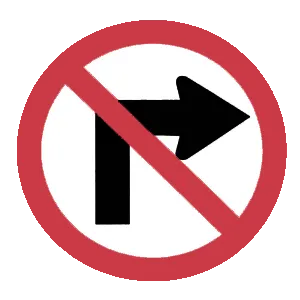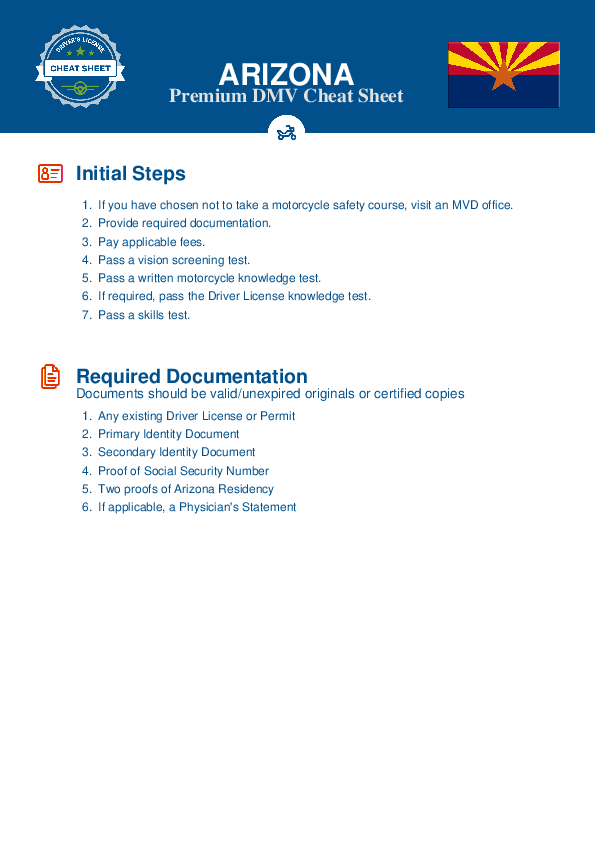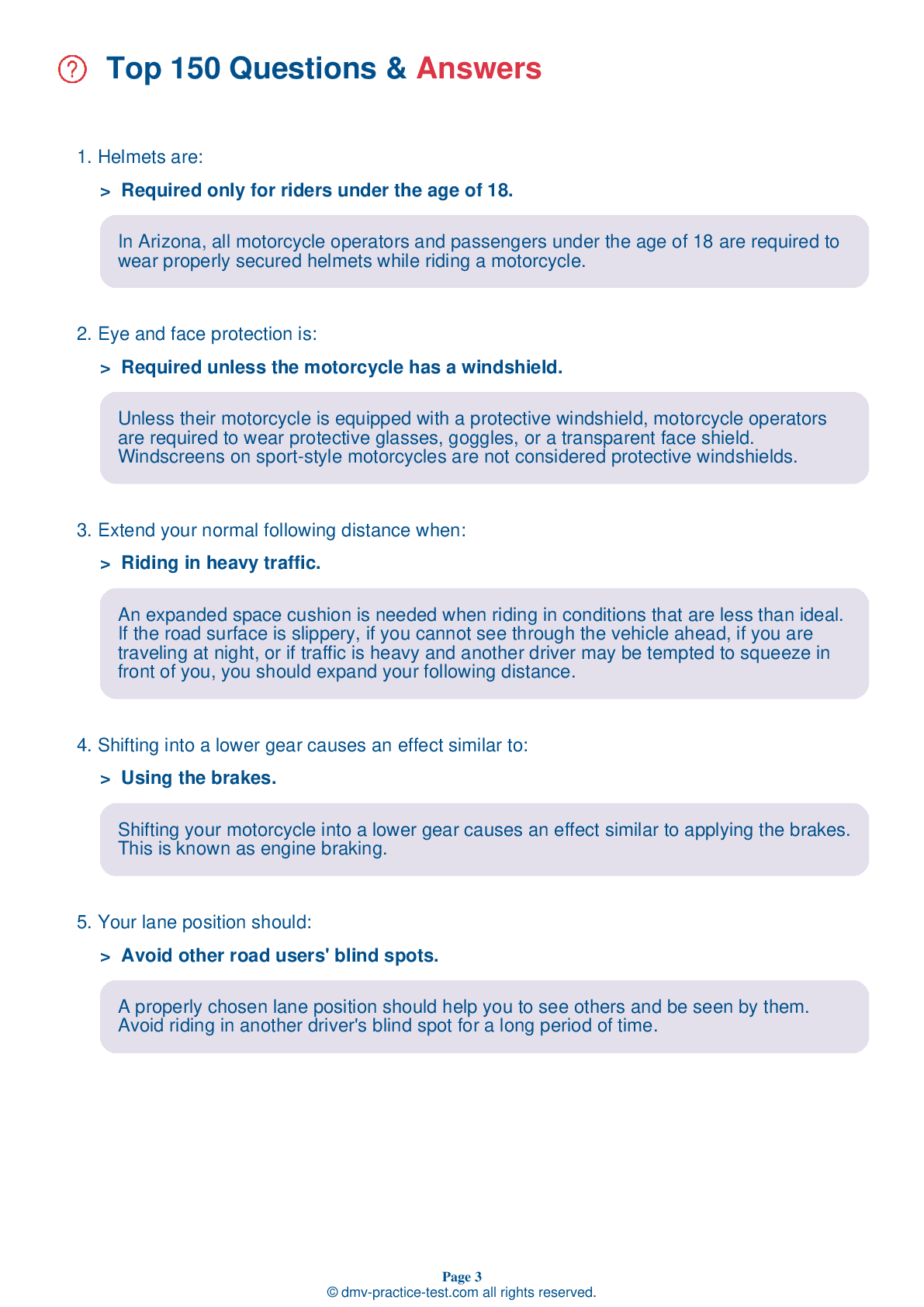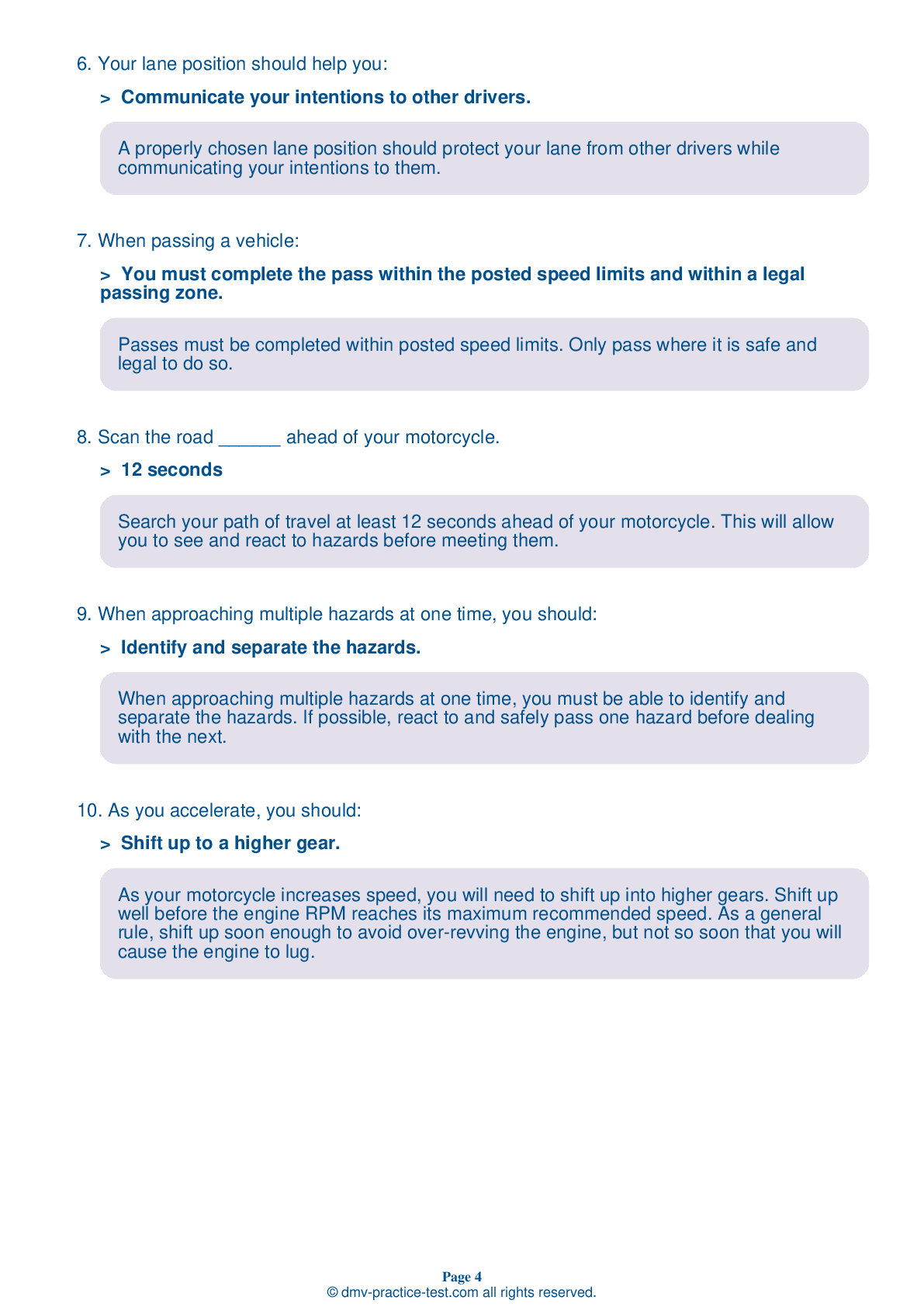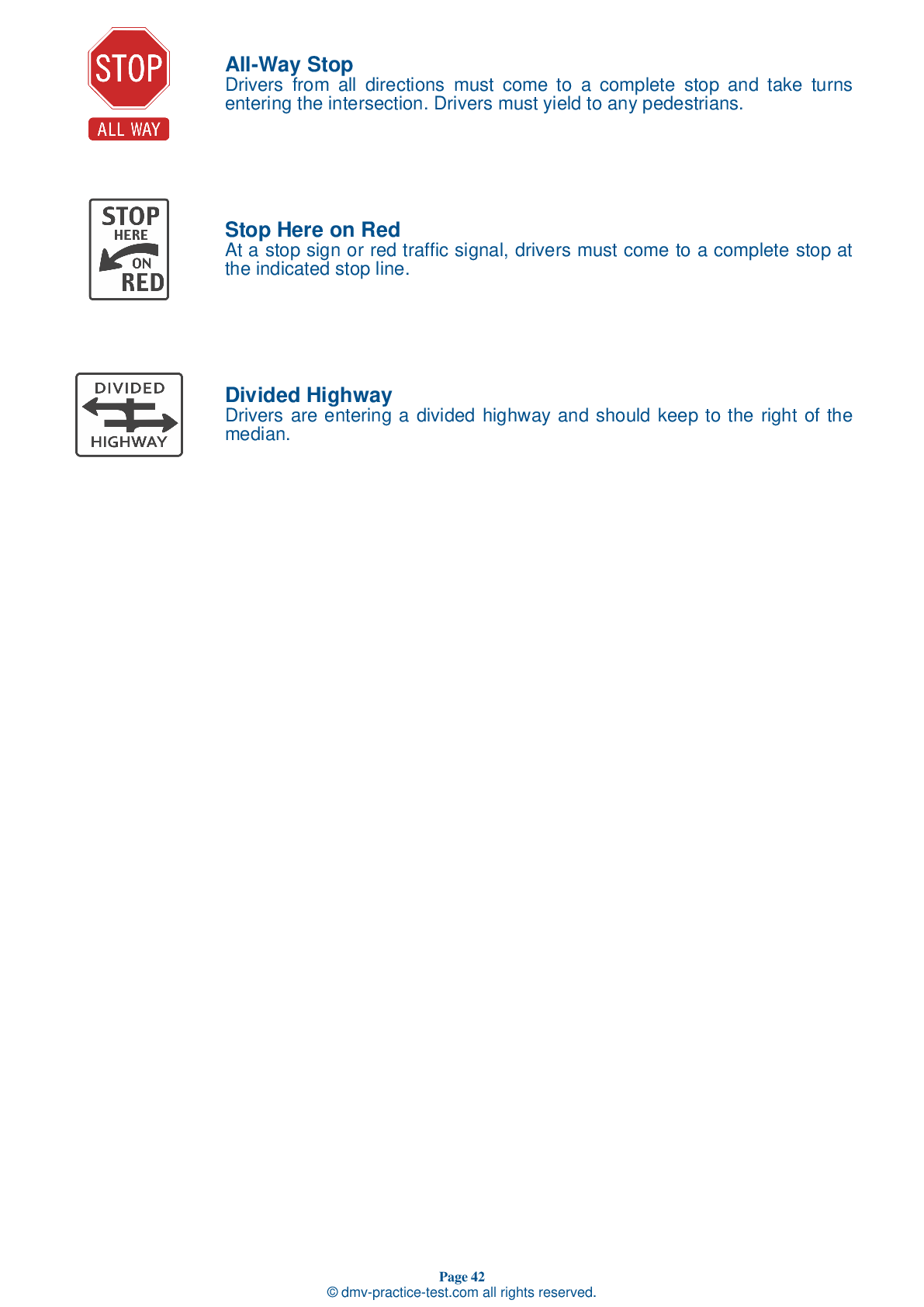DMV Permit Test #7
Motorcycle Test | License AZ 2026 | FREE Online Practice! #7
Take this FREE motorcycle test (license in AZ 2026) to check your knowledge of the road rules. To improve your results, download a motorcycle handbook online, study theory, and practice for free on our website. Still worried about how to get a motorcycle license in Arizona in 2026? Check our website for more sample tests, train as much as possible, and boost your grades!
30
25
16
1 . Making eye contact with another driver:
Means that the other driver knows you are there.
You should never take eye contact with another driver as a guarantee that they will properly yield the right-of-way to you.
2 . As you accelerate, you should:
Remain in a neutral gear.
As your motorcycle increases speed, you will need to shift up into higher gears. Shift up well before the engine RPM reaches its maximum recommended speed. As a general rule, shift up soon enough to avoid over-revving the engine, but not so soon that you will cause the engine to lug.
3 . To get the best possible protection, wear a helmet that:
Does not have a chinstrap.
Choose a helmet that meets U.S. Department of Transportation (DOT) and state standards. It should fit you snugly all the way around and be free of obvious defects.
4 . Successful motorcyclists know they are safest when they are:
In the left side of the lane.
Successful motorcyclists know that they are safest when they are clearly seen by other road users. Use your headlight, brake light, signals, and lane position to maximize your visibility.
6 . This sign means:
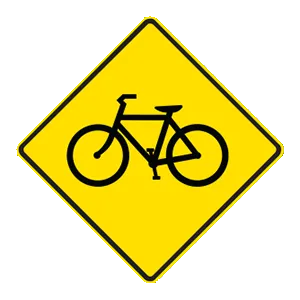
Stop ahead.
Warning signs prepare drivers for upcoming road conditions and hazards and are usually yellow with black markings. This sign alerts drivers to potential bicycle cross traffic.
7 . The best way to handle tailgaters is to:
Come to a complete stop.
If possible, change lanes and let a tailgater pass your vehicle. Speeding up may result in the driver continuing to tailgate you at a higher speed, thereby increasing the danger.
8 . This sign means:
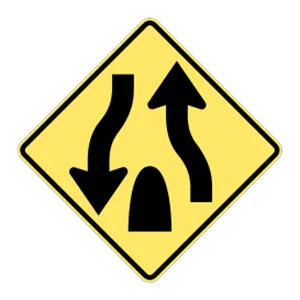
Bumps in the road.
This sign warns drivers that the divided highway ends ahead.
2026 Arizona | Frequently Asked Questions
To acquire a motorcycle driver's license in Arizona, you must first apply for a motorcycle instruction permit. This involves passing a written test. After practicing with the permit, you can apply for a motorcycle license, which requires passing a vision test and a skills test. Alternatively, you can complete an approved motorcycle driver education program to bypass the skills test.
In Arizona, the minimum age for obtaining a motorcycle license is 16 years old. However, if you are under 18, you must first hold a motorcycle instruction permit for at least six months and complete an approved motorcycle driver education program or have your parent or guardian certify that you have completed at least 30 hours of motorcycle riding practice.
Yes, you do need a dedicated license for motorcycle riding in Arizona. You can either add a motorcycle endorsement to your current driver's license or obtain a standalone motorcycle license. This requires passing both a written knowledge test and a skills test, or completing an approved motorcycle training course.
To apply for a motorcycle driver's license in Arizona, you'll need several documents: proof of identity (like a birth certificate or passport), Social Security number, and proof of Arizona residency. If you're under 18, you'll also need a parent or guardian's signature on the application. Remember to bring the completion card if you've completed a Motorcycle Safety Foundation course.
Yes, you will need to take a written exam for a motorcycle license in Arizona. The test covers subjects like motorcycle operation, traffic laws, road signage, safe riding practices, and handling emergency situations. However, if you complete a Motorcycle Safety Foundation course successfully, you can bypass this written test.
The motorcycle written test in Arizona covers a variety of topics related to motorcycle safety and operation. These include understanding traffic signs and signals, rules of the road, safe riding techniques, handling dangerous situations, and the effects of alcohol and drugs on motorcycle operation. It's all designed to ensure you can operate a motorcycle safely.
Yes, in Arizona, you can substitute the written test with a Motorcycle Safety Foundation (MSF) course. Upon successful completion of the MSF course, you'll receive a Motorcycle Safety Foundation card, which you can present at the MVD to waive the written and on-cycle skills test for your motorcycle endorsement.
Enrolling in a motorcycle training course in Arizona typically involves finding an approved training provider, checking the course schedule, and registering either online or by phone. Some providers may require payment at the time of registration. You'll need a valid driver's license or permit, and some courses may have age restrictions. Always confirm details with your chosen provider.
No, you don't have to own a motorcycle to take the license test in Arizona. You can use any legally registered and insured motorcycle for the test. If the motorcycle isn't registered in your name, you'll need signed permission from the owner. The motorcycle must also pass a pre-trip inspection.
Yes, you can use a friend's motorcycle for the driver's license evaluation in Arizona. However, the motorcycle must be legally registered, insured, and pass a pre-trip inspection. You must also have a signed permission from the owner if the motorcycle isn't registered in your name.
Yes, in Arizona, the motorcycle driving exam tests specific handling skills. These include the ability to start and stop, turn and swerve, and perform quick stops. It also tests your ability to negotiate intersections, maneuver around obstacles, and understand road signs. These skills are necessary for safe motorcycle operation in various traffic conditions.
Yes, Arizona imposes limitations on new motorcycle drivers. Those under 18 must hold an instruction permit for at least six months before obtaining a motorcycle license. They must also complete a driver education program or have a parent or guardian certify they've had at least 30 hours of supervised riding, including 10 hours of night riding.
Yes, your Arizona motorcycle license permits you to ride a motorcycle out of state. All U.S states recognize each other's driver's licenses under the Full Faith and Credit Clause of the U.S Constitution. However, you should abide by the motorcycle laws of the state you are visiting, as they may vary from Arizona's.
In Arizona, helmet laws are age-specific. If you are 17 years old or younger, you are legally required to wear a helmet when operating or riding on a motorcycle. However, for those who are 18 years or older, wearing a helmet is optional but highly recommended for safety purposes.
Yes, Arizona offers two types of motorcycle licenses. Class M is for all motorcycles, while a Class G graduated driver license or a Class D operator license with a motorcycle endorsement (J) is for motor-driven cycles with engine displacement of less than 100cc. The type of license needed depends on the type of motorcycle you plan to ride.
Yes, in Arizona, you can add supplementary endorsements to your motorcycle license. This allows you to operate additional types of vehicles. For example, a "J" endorsement allows you to legally operate a vehicle that requires a motorcycle license but has an enclosed passenger compartment. Each endorsement requires passing a separate written and/or skills test.
Yes, the motorcycle license test in Arizona can be taken in languages other than English. The Arizona Department of Transportation offers the exam in several languages, including Spanish. However, it's recommended to contact your local Motor Vehicle Department to confirm the availability of the test in your preferred language.
An effective strategy to prepare for the motorcycle license test is to thoroughly study the Arizona Motorcycle Operator Manual. It covers all the topics included in the test. You can also take online practice tests to familiarize yourself with the format and types of questions. Additionally, taking a motorcycle safety course can provide practical experience and knowledge.
Yes, in Arizona, the motorcycle written exam is available in multiple languages to accommodate non-English speakers. However, it's advisable to contact the Arizona Motor Vehicle Department ahead of time to confirm the availability of your preferred language. They can provide you with the necessary resources or schedule a translator if needed.
If you don't pass the motorcycle written test in Arizona, you're allowed to retake it. However, you must wait at least one day before making another attempt. It's recommended to study the Arizona Motorcycle Operator Manual thoroughly before retaking the test to increase your chances of passing.
